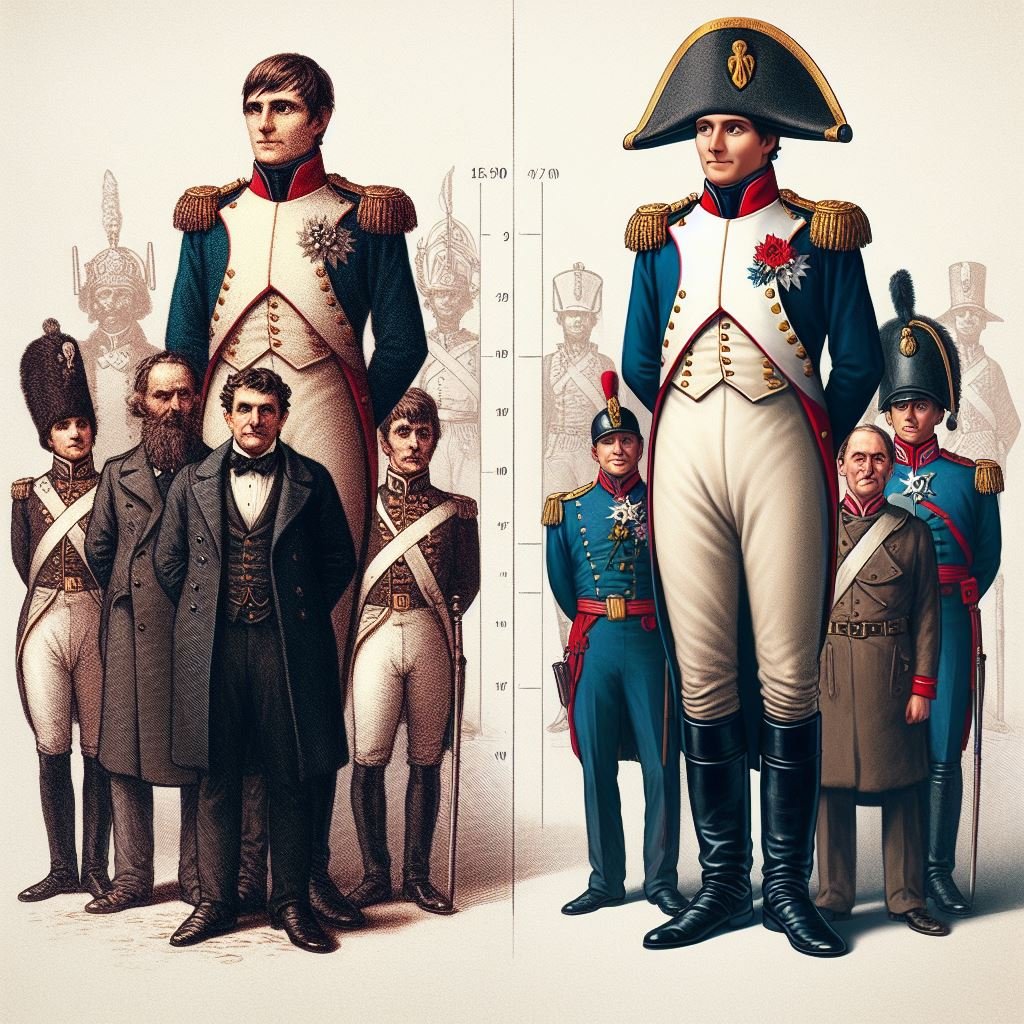The term “Napoleon complex” has become ingrained in popular culture. It suggests that short men overcompensate for their perceived lack of height through aggressive or domineering behavior. However, the historical truth behind this concept is more nuanced than the stereotype suggests.
Napoleon Bonaparte: A Man of Average Stature
Napoleon Bonaparte (1769-1821), the iconic French emperor, is often associated with shortness. However, recent research suggests this perception might be a historical misconception. Here’s a closer look at his actual height:
- French vs. Imperial Measurements: Much of the confusion surrounding Napoleon’s height stems from a discrepancy between French and Imperial measurement systems during his time. Many sources list him as around 5’2″ based on French inches (pouces), which were slightly shorter than their British counterparts.
- Estimates Based on Historical Records: Several reliable sources, including Napoleon’s valet Constant, General Gourgaud, and his personal physician Francesco Antommarchi, all recorded his height as just over 5 feet 2 inches (French measurement). Converting this to the Imperial system used today translates to roughly 5 feet 6.5 inches.
- Average Height in Napoleonic Era: While detailed historical records on average height during this period are scarce, estimates suggest the average French male in the early 1800s stood around 5’2″ to 5’3″. Therefore, even by the standards of his time, Napoleon wouldn’t have been considered exceptionally short.
Propaganda and the Power of Perception
So, if Napoleon wasn’t actually short, where did the perception of his shortness and the associated “Napoleon complex” originate? Here are some possible explanations:
- British Propaganda: Napoleon’s meteoric rise and dominance over Europe threatened British interests. British propaganda during the Napoleonic Wars often depicted him as a diminutive figure, both physically and metaphorically. These caricatures likely contributed to the lasting image of a short and aggressive emperor.
- Focus on Military Leadership: Napoleon’s success was largely attributed to his military brilliance and battlefield strategies. Leaders on horseback, often surrounded by taller soldiers, might naturally appear shorter in paintings and depictions. This focus on his military persona could have further solidified the image of a short, yet powerful, leader.
- The Allure of a Stereotype: The concept of a short man with an aggressive personality might have resonated with audiences because it offered a simplistic explanation for Napoleon’s ambition and military strategies. This stereotype, once established, became ingrained in popular culture.
Understanding the Napoleon Complex
The term “Napoleon complex” is now used to describe anyone, regardless of height, who exhibits aggressive or domineering behavior. However, it’s important to consider that:
- Short Stature Doesn’t Equal Aggression: There is no scientific evidence to suggest a causal link between height and aggressive behavior. While some studies might show a correlation, it’s likely due to social and cultural factors rather than a biological connection.
- Psychological Factors of Insecurity: People of any height might exhibit dominance or aggression due to various psychological factors like feelings of insecurity, a need for control, or a desire to compensate for perceived shortcomings.
- Focus on Individual Traits: Instead of relying on stereotypes, a more nuanced approach is needed. Understanding an individual’s personality, upbringing, and life experiences offers a more accurate explanation for their behavior than simply attributing it to their height.
Beyond the Myth: A Legacy of Leadership
Napoleon Bonaparte remains a fascinating figure in history, remembered for his military prowess, political reforms, and lasting impact on Europe. Focusing solely on the misconception of his height diminishes his complex legacy.
Moving Beyond Stereotypes
The story of Napoleon and the “Napoleon complex” serves as a cautionary tale against perpetuating stereotypes. It encourages us to critically examine historical narratives and focus on factual evidence. Understanding individual psychology and the influence of historical context provides a more accurate understanding of human behavior than relying on oversimplified clichés.
By debunking the myth of Napoleon’s shortness, we can move beyond the “Napoleon complex” stereotype and appreciate the complexities of leadership, ambition, and historical perception.



